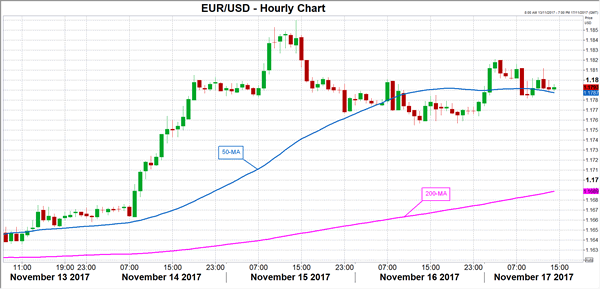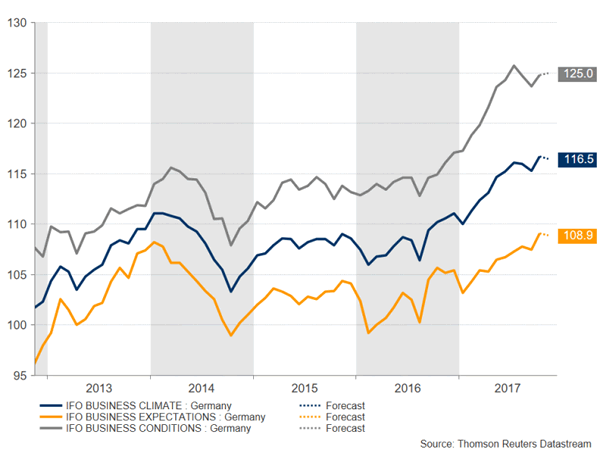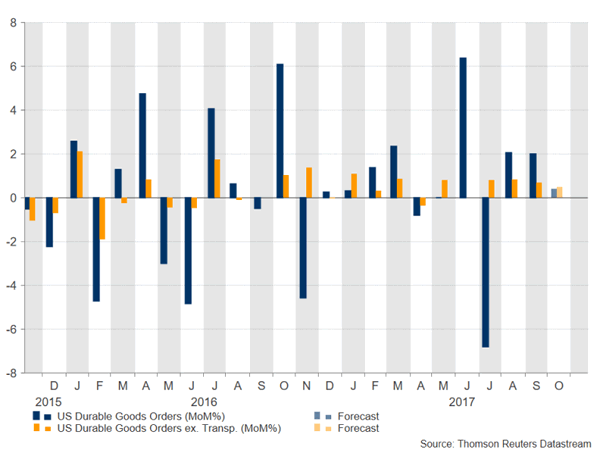With few exciting data releases on the calendar next week, attention will likely drift to central bank speeches and meeting minutes, developments on the US tax reform front and the UK Autumn budget.
RBA, ECB and Fed publish their minutes
Three central banks will release the minutes of their recent monetary policy meetings: the Reserve Bank of Australia, the European Central Bank and the Federal Reserve. The RBA is up first on Tuesday with the minutes of its November 7 policy meeting. After a series of recent data all pointing to a subdued inflation picture in Australia, the minutes are unlikely to alter that outlook even if the risks to growth are on the upside. The Australian dollar slid to 5-month lows this week and will probably struggle to find much support from the minutes, unless the Governor, Philip Lowe was to surprise with less dovish remarks in a speech the same day.
The FOMC’s minutes of the October 31-November 1 policy meeting, due on Wednesday, are also not expected to cause much of a stir given that the market odds of a rate hike at the next meeting in December are running above 90%. However, the euro may be more responsive to the ECB’s accounts of its October 26 meeting, which are published on Thursday. ECB President, Mario Draghi, had revealed in his press conference after the meeting that the Bank’s decision to keep the asset purchase program (APP) open-ended was not unanimous. Any indication in the minutes about the degree of opposition to a further extension of APP could spur the euro even higher, following this week’s impressive rally to a one-month high above $1.18.

Draghi testifies before European Parliament
Before the ECB’s minutes though, traders will get the chance to hear Draghi speak when he testifies before the European Parliament’s Economic and Monetary Affairs on Monday. Also important will be the November flash PMI releases from IHS Markit on Thursday, The Eurozone’s composite PMI is forecast to stay unchanged at 56.0 in November. Germany’s Ifo business climate gauge will follow on Friday. The index hit an all-time high in October on the back of a booming Germany economy, and is expected to hold near those levels in November.

Trade numbers from Japan and New Zealand
Japan and New Zealand will publish October trade figures on Monday and Thursday respectively. Japan will likely record its 11th consecutive month of positive export growth as the economy enjoys its longest run of uninterrupted growth since the turn of the century. The yen rarely reacts to Japanese trade data but the New Zealand dollar might see more action from the country’s respective figures. Also out of New Zealand next week are retail sales numbers for the third quarter on Wednesday. With kiwi traders still fretting about the new government’s economic policies and the potential monetary policy implications from reforming the Reserve Bank of New Zealand’s mandate, the kiwi could be sensitive to upside surprises to the data.
UK Autumn Budget: end of austerity?
The UK finance minister, Philip Hammond, has been under pressure to ease up on austerity following the Conservative party’s disastrous election result in June. In September, the government achieved its smallest budget deficit in 10 years and this may give Hammond the room to reduce the tax burden and increase spending. A pro-growth budget on Wednesday would be positive for sterling as it would raise the odds of a follow-up move by the Bank of England to this month’s quarter percentage point rate hike. Also to watch out of the UK next week is Thursday’s second estimate of GDP growth for the third quarter.
Quiet week for US ahead of Thanksgiving
The US economic calendar will be unusually light next week as markets will be closed on Thursday for Thanksgiving. Durable goods orders out on Wednesday will be the highlight in terms of data. Friday’s flash PMI releases from IHS Markit for November will likely attract more interest than usual in the absence of any competition. A speech by outgoing Fed Chair Janet Yellen on Wednesday should also draw the attention of dollar traders. But the main topic preoccupying investors’ minds will probably remain the tax plan as US Senators continue to finalize their version of the bill ahead of an expected vote the week after Thanksgiving.

The US dollar received a short-lived boost after the House of Representatives passed their version of the tax legislation this week. But the Senate’s version is proving more controversial with some Senate Republicans already voicing their opposition to it. Should Senators fail to bridge their differences over the coming week, a subsequent delay of the vote could further dampen sentiment for the dollar in the near term.
